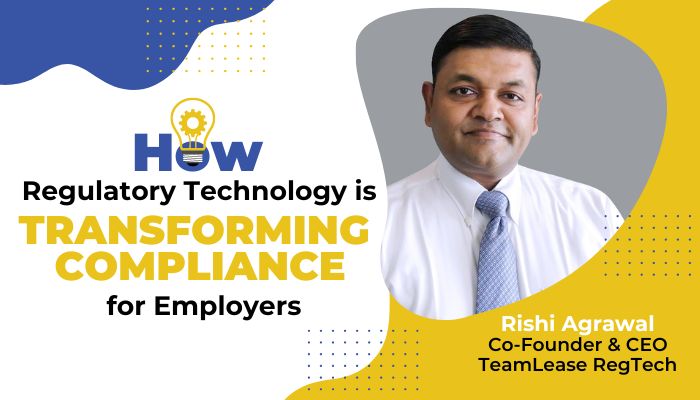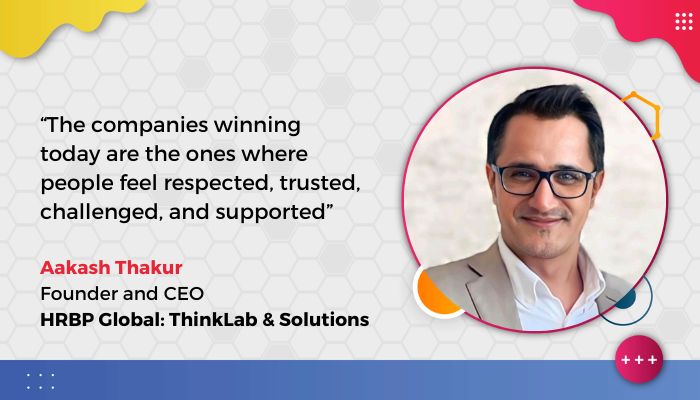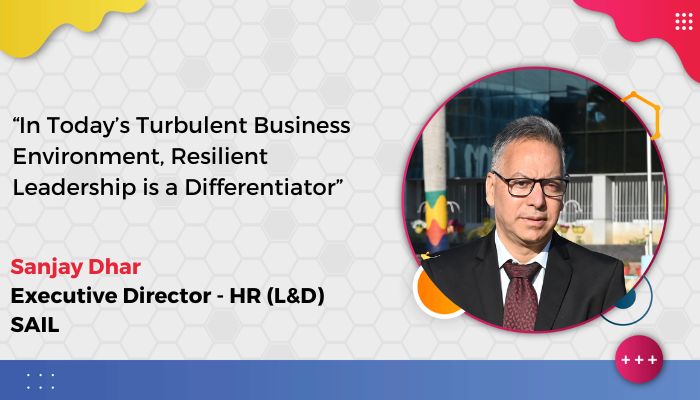Rishi Agrawal, Co-Founder and CEO, TeamLease RegTech, is of the opinion that digital compliance management solutions enable organisations to make a seamless shift from ‘reactive’ compliance to ‘dynamic’ compliance that is in tune with the evolving regulatory landscape.
The regulatory universe in India is complex and ever-changing. Employers are confronted with an intricate web of compliances that require deep expertise, timely action and effective coordination. For decades now, compliance functions have been reliant on ad-hoc, manual and paper-based processes. It is said that “to err is human” and compliance management is no exception. When the entire compliance lifecycle in an organisation is people-dependent, there is a significant margin for defaults, lapses and delays. The cost of poor compliance is simply too high as governments push for greater corporate accountability through stringent oversight and hefty penalties.
However, over the past few years, technology has transformed the way employers tackle compliance. Digital compliance management solutions pack the power of the web, mobile, cloud and analytics, providing employers with smart, efficient and productive methods to address their individual compliance needs. They also enable organisations to make a seamless shift from ‘reactive’ compliance to ‘dynamic’ compliance that is in tune with the evolving regulatory landscape. Resultantly, more and more organisations across the country are now aggressively digitising their compliance processes. This article highlights the advantages of digital compliance management solutions in overcoming the complex challenges of India’s regulatory environment.
Timely regulatory updates
There are constant changes in compliance requirements, which compounds business uncertainty. In 2021, there were 3,577 regulatory changes, amounting to an average of 10 regulatory changes per day. The regulatory updates relate to important changes in dates, procedures, penalties and calculations, among others, and are published on 2,000+ government websites. Often, these changes are applicable immediately, thus requiring time-sensitive implementation. There is no effective manual way for an employer to stay updated on these regulatory changes.
However, digital compliance platforms can track regulatory changes across thousands of websites on a real-time basis and deliver the relevant updates typically within 24 hours of notification. Through automated compliance management, employers can avoid missing critical updates and tackle them in a timely manner.
Related Reads
Integrated document management
In India, compliance and paperwork go hand in hand. Documents such as applications, acknowledgements, forms, receipts, licences and registers, among many others, lie at the heart of compliance. Unfortunately, a major chunk of compliance documentation in the country is still paper-based with little or no digital functionality. Given the large quantum of paperwork involved, manual management of documentation is difficult for employers.
Digital compliance software addresses such issues by providing innovative solutions to manage the entire documentation process. At the outset, it creates a central repository of all compliance paperwork containing digital, verified and tamper-proof copies of each document. It also serves as a nodal point for all working files. The digital document repository serves as a one-stop destination for arranging and accessing paperwork. Digitally integrated document management saves valuable time, energy and resources for employers, allowing them to shift their focus to priority tasks.
Smart tools and features
Digital compliance platforms offer a range of unique features that manual processes simply cannot match.
- Smart Dashboards: They enable real-time tracking across various parameters and provide a realistic picture of the residual compliance risk. Elements such as colour coding, smart widgets and click-through charts offer drill-down capabilities for accessing compliance status by Act, Entity, Location, Function, Department, User or Risk.
- Customised Workflows and Analytics: They allow employers to configure their compliance workflows in a manner suited to their business needs. Based on the unique compliance requirements of the organisation, they also provide on-demand analytics and reporting capabilities to flag compliance risks.
- Alerts, Reminders and Escalations: They provide prompt alerts for regulatory updates and periodic reminders for time-sensitive compliances. Employers no longer have to worry about missing important dates. Even in cases where a user misses a date, escalations get triggered so that corrective action can be taken.
Reduced cost of compliance
While large organisations can afford to hire a dedicated team of compliance officers, small and mid-sized enterprises do not have the resources for an in-house compliance department. Often, the responsibility for ensuring compliance is scattered across various departments, resulting in a lack of coordination and duplication of efforts. In most cases, company secretaries and lawyers assume the additional role of compliance management.
Typically, digital compliance software can be onboarded at a cost lower than the salary of a junior compliance officer. They are quick and easy to adopt and do not require any additional investment on IT infrastructure. User-friendly interface allows employees with varying skills, experience, and tech savviness to adapt to the software without the employer having to spend on training.
In India’s 21st-century regulatory environment, manual compliance is a glaring anomaly. As the government pushes the pedal on stricter enforcement, employers must step up their compliance game. As illustrated above, digitisation is the perfect solution to these emerging compliance needs. With employers looking to establish greater control and visibility over their compliance functions, manual compliance processes are fast becoming a thing of the past. The switch to automated compliance is allowing organisations to spread their wings without having to worry about the effective management of their compliance obligations. Going digital is the key to accurate, timely, transparent and accountable compliance!
About the Author
Rishi Agrawal is Co-founder and CEO at TeamLease RegTech. He is a passionate technology entrepreneur who believes in the potential of technology to transform human lives. Over the past few years, Rishi has been working on developing a regulatory technology platform to automate and simplify India’s complex compliance environment. He has worked with over 1,000 organisations (Enterprises & MSMEs) across 40 Industries in India helping them through their compliance management journey. He deeply understands the complexity of managing compliances across central, state and local governments. He has been partnering with corporate India, industry bodies and think-tanks to enable Compliance 3.0. He created the four vector framework of rationalisation, simplification, digitisation and decriminalisation. Rishi served as an advisor to the WGOM (Working Group of Ministers), works closely with several ministries, DPIIT, Invest India and World Bank on various ease of doing business initiatives. He is also a member of CII Taskforce for Ease of Doing Business. Rishi frequently writes in ORF (Observer Research Foundation), Financial Express, India Today, Mint among others.






